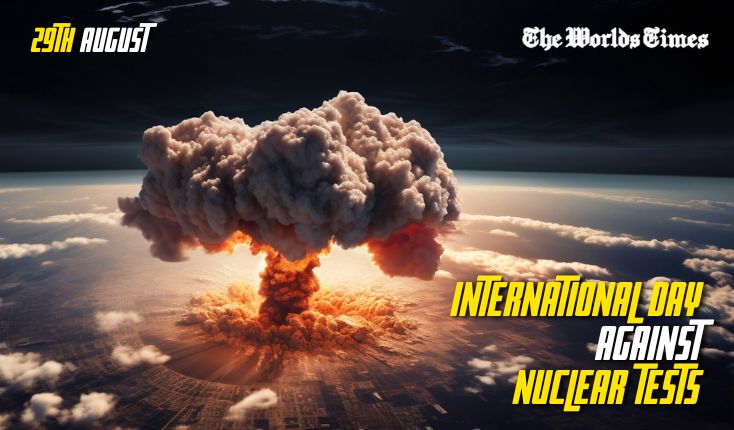International Day against Nuclear Tests
The International Day against Nuclear Tests is observed every year on August 29. The United Nations created this day on December 2, 2009, during their 64th session. Since the first nuclear test on July 16, 1945, nearly 2,000 tests have been conducted. In the beginning, people ignored the harmful effects of nuclear testing on human life, but history has shown just how destructive nuclear weapons can be. These weapons are extremely dangerous, and the world would be better off without them.
History of International Day against Nuclear Tests
On December 2, 2009, during the United Nations’ 64th session, a resolution was unanimously passed to declare August 29 as the International Day Against Nuclear Tests. The main idea of the resolution was that nuclear testing should be stopped to prevent serious harm to people’s lives and health. Ending nuclear tests is seen as a key step toward creating a world without nuclear weapons.
Kazakhstan started this initiative, choosing August 29 because it marks the date when the Semipalatinsk Nuclear Test site was closed in 1991.
The first International Day Against Nuclear Tests was observed in 2010. Since then, a lot of effort has been put into organizing worldwide events like conferences, competitions, publications, media broadcasts, and lectures. Many sponsors, government agencies, and organizations have supported the cause and campaigned for a complete ban on nuclear testing.
International Day against Nuclear Tests timeline

International Day against Nuclear Tests FAQs
Which country tested a nuclear bomb recently?
The latest nuclear test was carried out by North Korea in September 2017.
When did the UN declare the observation of the International Day Against Nuclear Test?
The International Day for the Total Elimination of Nuclear Weapons was observed for the first time in September 2014.
Which President signed the Nuclear Test Ban treaty?
President John F. Kennedy signed the Nuclear Test Ban treaty.
How to Observe International Day Against Nuclear Test
1. Learn more about nuclear testing
While many people know about nuclear bombs, fewer are aware of the testing and its consequences. Take time to read about these tests and hear stories from those who lived near test sites and suffered the effects.
2. Get involved in a local campaign
On International Day Against Nuclear Tests, civil society groups organize campaigns to push for policy changes. Join a local campaign and speak out against nuclear testing.
3. Attend a seminar
The United Nations and other organizations hold seminars, conferences, and discussions every year on this day. Find one near you or join an online session to learn more.
5 Facts About Nuclear Weapons
1. The Chernobyl Disaster
The explosions at the Chernobyl power plant released 100 times more radiation than the atomic bombs dropped on Hiroshima and Nagasaki during World War II.
2. The Most Powerful Nuclear Weapon
Russia’s Tsar Bomba is the most powerful weapon ever created, producing a mushroom cloud that was 25 miles wide and 40 miles high.
3. Removing Outer Clothing
After a nuclear disaster, removing your outer clothing can get rid of 90% of the radioactive material.
4. Nuclear Accidents in Japan
Since 1999, Japan has experienced three nuclear power plant accidents.
5. Rethinking Nuclear Energy
Following Japan’s nuclear disaster in 2011, many countries are turning to alternative energy sources, with Germany planning to shut down all its reactors by 2022.
Why International Day against Nuclear Tests is Important
A. Highlighting the Dangers of Nuclear Testing
Nuclear testing has exposed communities to harmful radiation and radioactivity throughout history, leading to devastating consequences.
B. Shifting to Sustainable Energy
Nuclear energy isn’t just about bombs; it’s also used in power plants in some countries. However, the risks associated with nuclear energy need serious consideration, prompting a shift toward safer, sustainable power sources.
C. Aiming for a Better Future
A world without nuclear power might seem idealistic, but it could foster better international dialogue and reduce the reliance on warfare.
International Day against Nuclear Tests dates
| Year | Date | Day |
|---|---|---|
| 2025 | August 29 | Friday |
| 2026 | August 29 | Saturday |
| 2027 | August 29 | Sunday |
| 2028 | August 29 | Tuesday |
| 2029 | August 29 | Wednesday |
Also Read:
Women’s Equality Day
Health Unit Coordinators Day
National Surgical Oncologist Day
































































